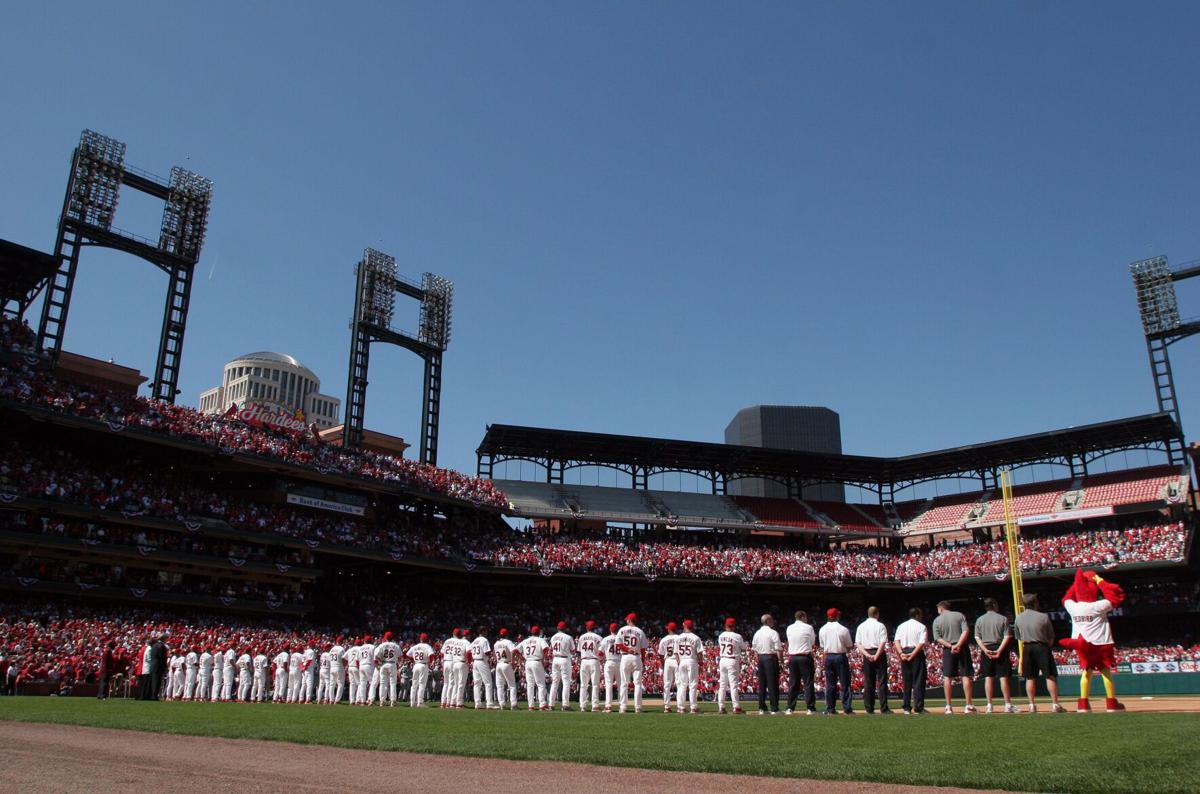Here is our original report on Opening Day at Busch Stadium, April 10, 2006.
They came, all 41,936 of them, to see something new.
There awaited the lazy slope of a spanking new ballpark, mostly brick and painted red with freshly laid bluegrass and scoreboards offering sharper colors with vivid signage. Old Busch lay as a fond memory behind left field, its remnants cleared months ago. But better than merely offering some package just out of the box, new Busch provided those who drew near Monday some fondly familiar scenes.
Stan leaned on Lou. The Clydesdales and the convertibles did their thing around the warning track.
Carp' and Albert, Cy Young and MVP, threw out first pitches to Willie McGee and Gibby, one of six Hall of Famers on the field.
A sellout crowd sang the anthem a cappella rather than some entertainer giving an "interpretation."
People are also reading…
"If you didn't feel something," said Tony La Russa, managing his 11th opening day for the Cardinals, "then you don't have a heartbeat."
"In a lot of places this would've come off hokey because there's not the tradition this place has," said former right fielder and current guest coach Larry Walker, who played his final 1 1/2 seasons wearing the birds on the bat. "It works here because it's not contrived. It's genuine. It's real."
New Busch wasn't "a lot of places" on Monday. It was the place, with its rounded, bricked apex behind home plate reminding commissioner Bud Selig of Ebbets Field. "Very distinctive," the commissioner called it.
The home opener started against the new-and-improved Milwaukee Brewers four minutes late at 3:14 p.m. with the Redbirds and starting pitcher Mark Mulder looking like themselves. Less than three hours later the Cardinals had taken a 6-4 win with Mulder providing eight-plus innings in addition to two RBIs, a double and a two-run home run. Pujols contributed the first Cardinals home run in new Busch -- a 445-foot bullet -- to lead off the third inning against the Brewers' Tomo Ohka.

10 April, 2006 -- Cardinals first baseman Albert Pujols hits a third inning homerun, the first Cardinals homerun in the new Busch Stadium, during a game between the ºüÀêÊÓƵ Cardinals and the Milwaukee Brewers at Busch Stadium in ºüÀêÊÓƵ, Mo. POST-DISPATCH PHOTO BY CHRIS LEE
Mulder's complete performance came five days after an unfulfilling seven-inning outing against the Philadelphia Phillies. In that game he lost a two-run lead and received no decision because of third baseman David Bell's seventh-inning home run. Mulder could recall committing a similar sin only several times in six previous seasons.
The first run and first home run belonged to visiting players. Left fielder Carlos Lee singled to begin the second inning before third baseman Bill Hall drove a pitch into the right-center field stands for a quickie 2-0 lead.
From there, Mulder took over. He got double plays in the third, sixth and seventh innings and in the game's pivotal point struck out two in the fourth inning with runners at second and third and one out.
"To me it was huge, because there were a lot of times last season where I got a ground ball and one of the runs scored," Mulder said. "So to get those strikeouts there, at least the first one with one out, that was my focus. That was probably the biggest inning in the game."
Center fielder Jim Edmonds helped Mulder with a tumbling catch against Brady Clark to open the fifth inning. Third baseman Scott Rolen then robbed pinch hitter Jeff Cirillo with a backhanded, diving stop of his grounder to lead off the eighth. Rolen finished the play by throwing to first from his knees.
The Cardinals tied the score in the third inning with Pujols' fourth home run and catcher Yadier Molina's line drive sacrifice fly to score Rolen. A former designated hitter when not pitching at Michigan State, Mulder became the game-winning run after walking to lead off the fourth. Rolen's one-out, bases-loaded double scored him and David Eckstein for a 4-2 lead.
Calling Monday "kind of the same" as Philadelphia, Mulder added, "I got a few more double plays and I didn't make the one mistake late in the game. After we took the 4-2 lead I just tried to stay focused and make good pitches, because as mad as I was after that first game I was not about to let that happen again."
There was one major difference. In the seventh, between throwing rapid-fire frames, Mulder provided the afternoon's killer shot when he crushed a two-run homer off reliever Jose Capellan. A second earlier, closer Jason Isringhausen had turned to bullpen coach Marty Mason and called the shot. The Cardinals led 6-2, more than enough to withstand the Brewers' ninth-inning rally against Braden Looper and Isringhausen.
"It was cool," said Mulder, a career .119 hitter without an extra-base hit in 84 at-bats before Monday. "Going around second, I didn't really feel anything. I was just trying not to smile, or laugh. Because I wanted to.
"It was a cool experience, but I'm sure there's a pretty good chance of that not happening again this year."
Mulder proclaimed after his first Grapefruit League start that he felt better than at any time during his 16-win 2005. He has walked one in 15 regular-season innings and no longer varies his delivery pitch to pitch.
"I'm making better pitches. It's the little things," Mulder said. "Last year I fell behind a lot and made mistakes over the plate. I'm making better pitches this year. I'm making the pitches when I need to. It's helped me a lot so far."
"To me watching him, the rhythm of his delivery is a lot smoother and a lot better," said Jason Marquis, reigning Silver Slugger recipient among NL pitchers. "We talk among ourselves about things. Anything to help us get that extra edge we try to find. It looks like his delivery is smooth and not as choppy as it was last year. His first spring start of this year was better than any start he had last year."
Marquis was banned from the starting pitchers' hitting "game" this spring. After hitting .310 with 10 RBIs last season, he is considered too good. Monday allowed Mulder a little payback.
"I think he's happy for me but way down deep inside he's mad. He just won't admit it," the lefthander said.
Just as there were comparisons made between Mulder's game Monday and his consistent seasons with the Oakland A's, images of old Busch were perceived by some in the new.
Some players thought the park looked big, while others noted how well the ball carried. No one questioned the legitimacy of the game's three home runs. "The ball Albert hit would've gone out anywhere," La Russa said. "There weren't balls that were hit to the warning track that did not go out that would have gone out in other ballparks. I think it's going to play like the other one."
Some thought they saw similarities in the layout, the padding along the walls and the location of the bullpens. Enough remained the same for the new park to feel familiar. Marquis called it "tweaking."
The connection went further to some.
"There's a new stadium, but it's the fans who make this place special," Edmonds said. "It's hard to describe. Day in, day out they come here and people are cheering. You get used to playing on the field but you never get tired of hearing them in the stands."
Opening Day at Busch Stadium in 2006


Cardinals fans watch the Opening Day game against the Milwaukee Brewers at the new Busch Stadium in downtown ºüÀêÊÓƵ on Monday, April 10, 2006 from near the 200 level foul pole. Photo by Laurie Skrivan.Â

10 April, 2006 -- Cardinals first baseman Albert Pujols tags out Milwaukee's Gabe Gross for the final out of the game as closer Jason Isringhausen backs him up during a game between the ºüÀêÊÓƵ Cardinals and the Milwaukee Brewers at Busch Stadium in ºüÀêÊÓƵ, Mo. POST-DISPATCH PHOTO BY CHRIS LEE

10 April, 2006 -- Cardinals starting pitcher Mark Mulder is congratulated by teammates as he returns to the dugout after hitting a two-run homerun in the seventh inning during a game between the ºüÀêÊÓƵ Cardinals and the Milwaukee Brewers at Busch Stadium in ºüÀêÊÓƵ, Mo. POST-DISPATCH PHOTO BY CHRIS LEE

(Monday, April 10, 2006)---LEFT TO RIGHT, Willie McGee shakes hands with Albert Pujols as Bob Gibson congratulates Chris Carpenter after Pujols and Carpenter threw out the first ceremonial pitch during Opening Day at the new Busch Stadium in downtown ºüÀêÊÓƵ on Monday, April 10, 2006. CHRIS LEE /ST. LOUIS POST-DISPATCH

MONDAY 10 APRIL 2006 -- ST. LOUIS -- Don Steers, left, and Mike Steers, both of Mt. Zion, Ill., admire the view from the upper deck before the start of the opening day game at the new Busch Stadium in ºüÀêÊÓƵ. JB FORBES / ST. LOUIS POST-DISPATCH

MONDAY 10 APRIL 2006 -- ST. LOUIS -- A sell-out crowd of 41,936 filled the new Busch Stadium for the home opener in ºüÀêÊÓƵ 10 April 2006. JB FORBES / ST. LOUIS POST-DISPATCH

MONDAY 10 APRIL 2006 -- ST. LOUIS -- A sell-out crowd of 41,936 filled the new Busch Stadium for the home opener in ºüÀêÊÓƵ 10 April 2006. JB FORBES / ST. LOUIS POST-DISPATCH

(Monday, April 10, 2006)---Cardinals fans LEFT TO RIGHT, Shari Mezo, of St. Ann, hugs, Mindy Primm, of St. Charles, CENTER, and Kenny Sutton, of Knox County, MO, LEFT, as she celebrates the Cardinals victory over the Milwaukee Brewers on Opening Day at the new Busch Stadium in downtown ºüÀêÊÓƵ on Monday, April 10, 2006. LAURIE SKRIVAN /ST. LOUIS POST-DISPATCH










